Report: Intercultural Training Program for Australian Islanders
VerifiedAdded on 2022/11/26
|12
|2517
|243
Report
AI Summary
This report outlines an intercultural training program designed to integrate Torres Strait Islanders into the political, social, and economic discourse of Australia. The program, spanning three days, aims to enhance their understanding of the dominant culture while respecting their unique cultural background. The report details the target audience, program objectives, and daily activities, which include seminars, workshops, and guest lectures. Key topics covered are culture, communication, social identity, multiculturalism, stereotypes, discrimination, intercultural competence, and interpersonal relations. The training incorporates ethical considerations such as confidentiality and utilizes evaluation tools to assess its effectiveness. The program's structure is designed to provide a comprehensive understanding of cultural aspects, communication methods, and social integration, fostering intercultural competence and mutual respect. The report also emphasizes the importance of addressing stereotypes and promoting multiculturalism to facilitate effective communication and social harmony. The report concludes with a discussion on the importance of intercultural competence and the application of various theories such as social communication and social penetration to enhance the training's effectiveness.
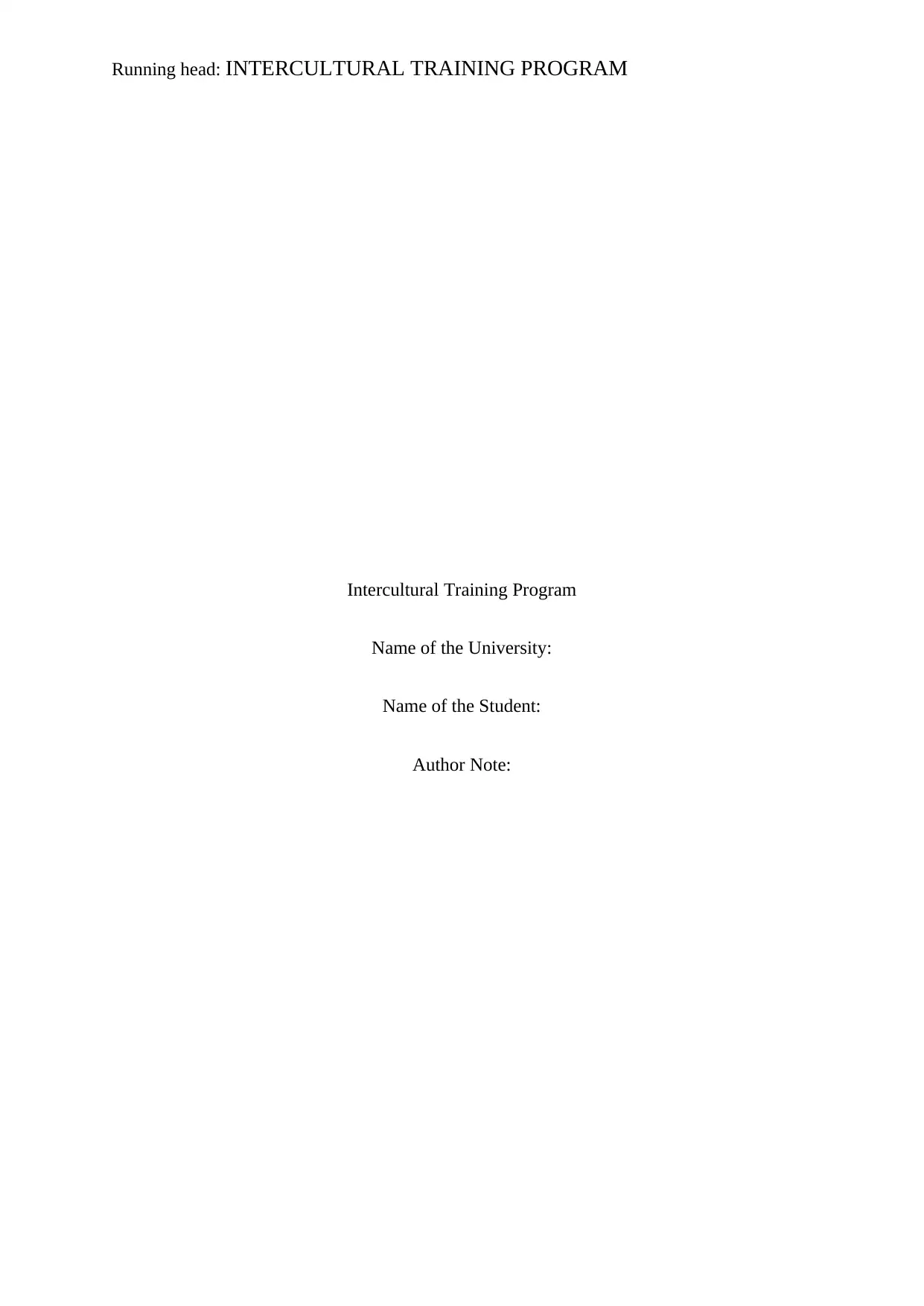
Running head: INTERCULTURAL TRAINING PROGRAM
Intercultural Training Program
Name of the University:
Name of the Student:
Author Note:
Intercultural Training Program
Name of the University:
Name of the Student:
Author Note:
Paraphrase This Document
Need a fresh take? Get an instant paraphrase of this document with our AI Paraphraser
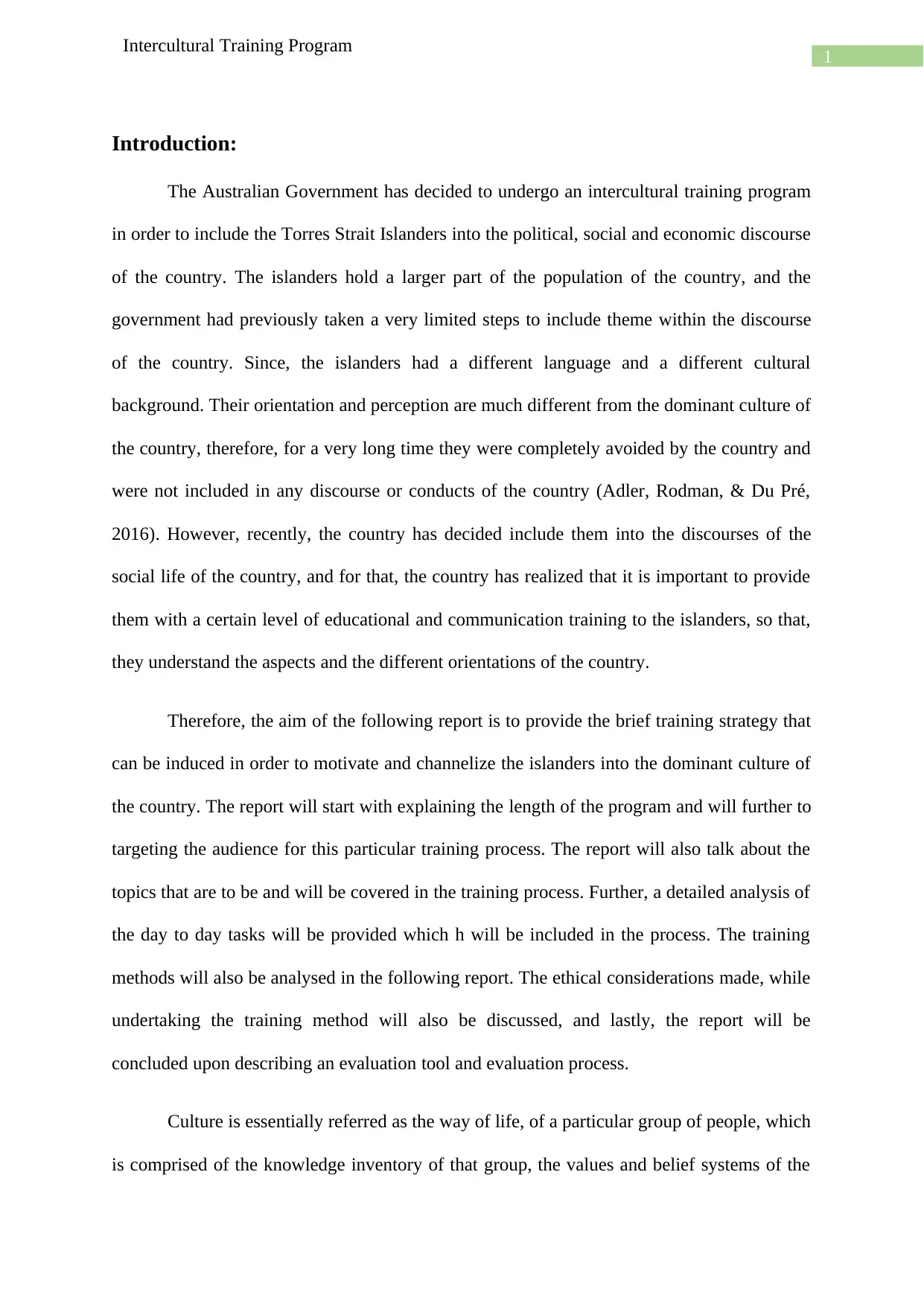
1
Intercultural Training Program
Introduction:
The Australian Government has decided to undergo an intercultural training program
in order to include the Torres Strait Islanders into the political, social and economic discourse
of the country. The islanders hold a larger part of the population of the country, and the
government had previously taken a very limited steps to include theme within the discourse
of the country. Since, the islanders had a different language and a different cultural
background. Their orientation and perception are much different from the dominant culture of
the country, therefore, for a very long time they were completely avoided by the country and
were not included in any discourse or conducts of the country (Adler, Rodman, & Du Pré,
2016). However, recently, the country has decided include them into the discourses of the
social life of the country, and for that, the country has realized that it is important to provide
them with a certain level of educational and communication training to the islanders, so that,
they understand the aspects and the different orientations of the country.
Therefore, the aim of the following report is to provide the brief training strategy that
can be induced in order to motivate and channelize the islanders into the dominant culture of
the country. The report will start with explaining the length of the program and will further to
targeting the audience for this particular training process. The report will also talk about the
topics that are to be and will be covered in the training process. Further, a detailed analysis of
the day to day tasks will be provided which h will be included in the process. The training
methods will also be analysed in the following report. The ethical considerations made, while
undertaking the training method will also be discussed, and lastly, the report will be
concluded upon describing an evaluation tool and evaluation process.
Culture is essentially referred as the way of life, of a particular group of people, which
is comprised of the knowledge inventory of that group, the values and belief systems of the
Intercultural Training Program
Introduction:
The Australian Government has decided to undergo an intercultural training program
in order to include the Torres Strait Islanders into the political, social and economic discourse
of the country. The islanders hold a larger part of the population of the country, and the
government had previously taken a very limited steps to include theme within the discourse
of the country. Since, the islanders had a different language and a different cultural
background. Their orientation and perception are much different from the dominant culture of
the country, therefore, for a very long time they were completely avoided by the country and
were not included in any discourse or conducts of the country (Adler, Rodman, & Du Pré,
2016). However, recently, the country has decided include them into the discourses of the
social life of the country, and for that, the country has realized that it is important to provide
them with a certain level of educational and communication training to the islanders, so that,
they understand the aspects and the different orientations of the country.
Therefore, the aim of the following report is to provide the brief training strategy that
can be induced in order to motivate and channelize the islanders into the dominant culture of
the country. The report will start with explaining the length of the program and will further to
targeting the audience for this particular training process. The report will also talk about the
topics that are to be and will be covered in the training process. Further, a detailed analysis of
the day to day tasks will be provided which h will be included in the process. The training
methods will also be analysed in the following report. The ethical considerations made, while
undertaking the training method will also be discussed, and lastly, the report will be
concluded upon describing an evaluation tool and evaluation process.
Culture is essentially referred as the way of life, of a particular group of people, which
is comprised of the knowledge inventory of that group, the values and belief systems of the
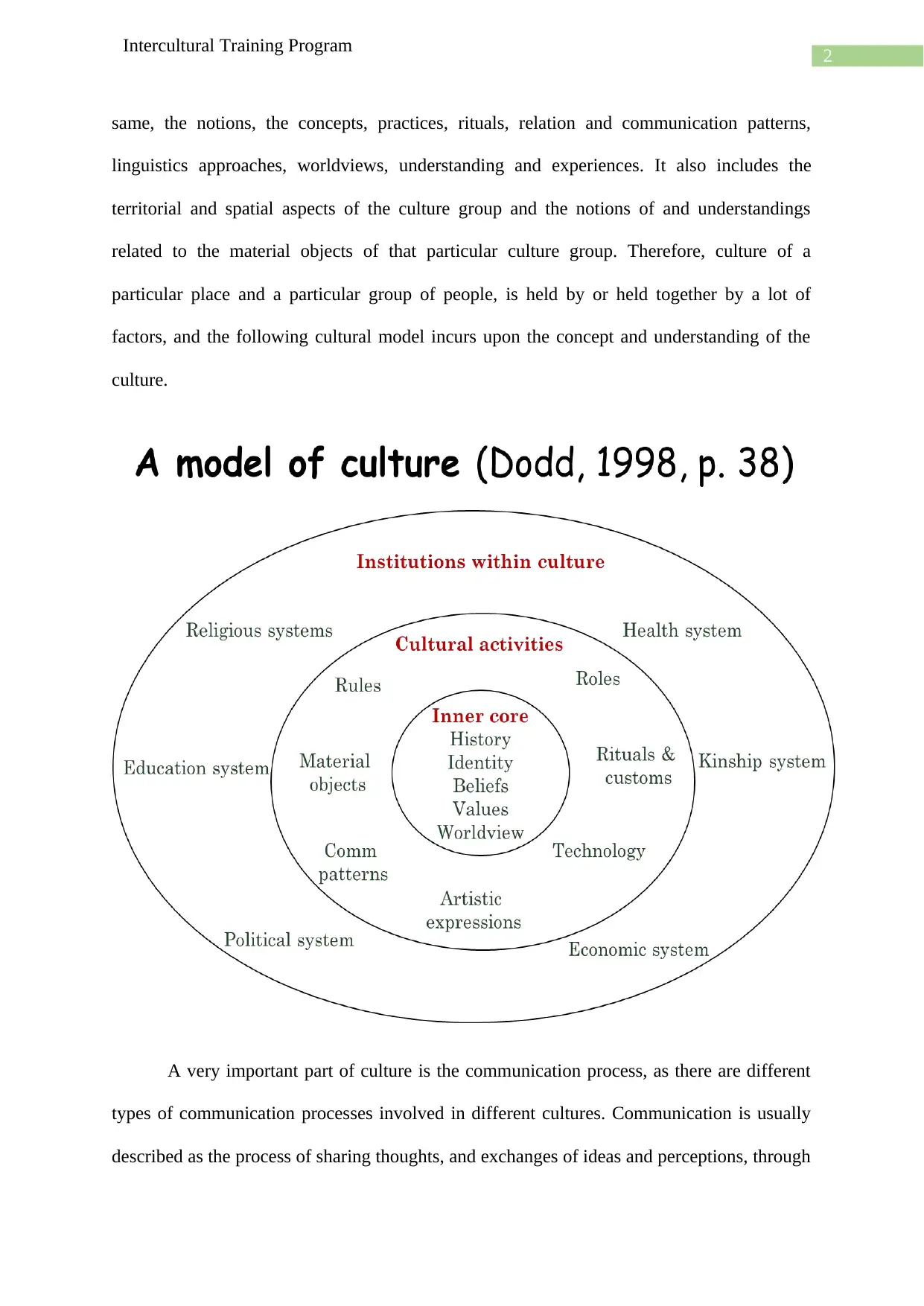
2
Intercultural Training Program
same, the notions, the concepts, practices, rituals, relation and communication patterns,
linguistics approaches, worldviews, understanding and experiences. It also includes the
territorial and spatial aspects of the culture group and the notions of and understandings
related to the material objects of that particular culture group. Therefore, culture of a
particular place and a particular group of people, is held by or held together by a lot of
factors, and the following cultural model incurs upon the concept and understanding of the
culture.
A very important part of culture is the communication process, as there are different
types of communication processes involved in different cultures. Communication is usually
described as the process of sharing thoughts, and exchanges of ideas and perceptions, through
Intercultural Training Program
same, the notions, the concepts, practices, rituals, relation and communication patterns,
linguistics approaches, worldviews, understanding and experiences. It also includes the
territorial and spatial aspects of the culture group and the notions of and understandings
related to the material objects of that particular culture group. Therefore, culture of a
particular place and a particular group of people, is held by or held together by a lot of
factors, and the following cultural model incurs upon the concept and understanding of the
culture.
A very important part of culture is the communication process, as there are different
types of communication processes involved in different cultures. Communication is usually
described as the process of sharing thoughts, and exchanges of ideas and perceptions, through
⊘ This is a preview!⊘
Do you want full access?
Subscribe today to unlock all pages.

Trusted by 1+ million students worldwide
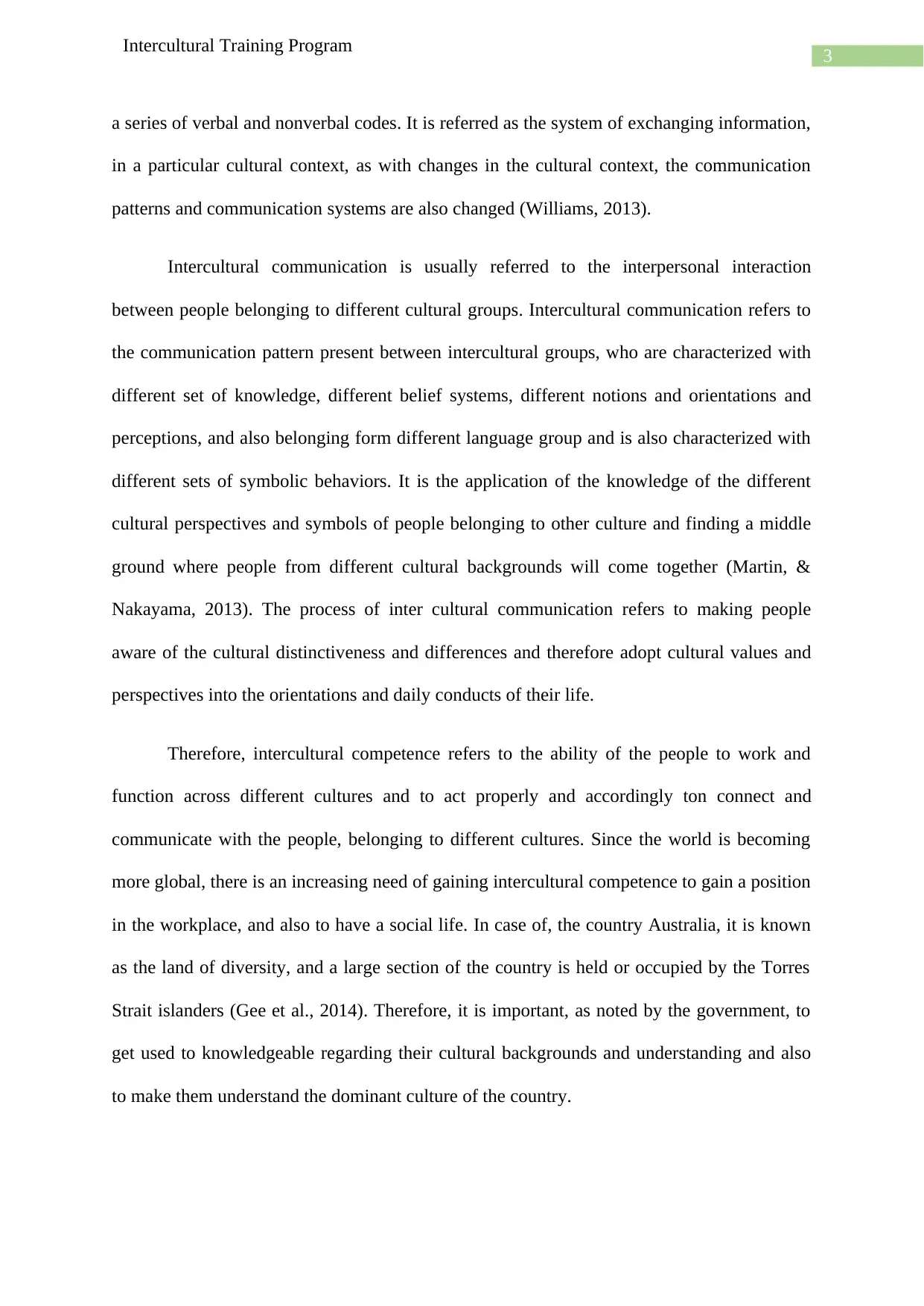
3
Intercultural Training Program
a series of verbal and nonverbal codes. It is referred as the system of exchanging information,
in a particular cultural context, as with changes in the cultural context, the communication
patterns and communication systems are also changed (Williams, 2013).
Intercultural communication is usually referred to the interpersonal interaction
between people belonging to different cultural groups. Intercultural communication refers to
the communication pattern present between intercultural groups, who are characterized with
different set of knowledge, different belief systems, different notions and orientations and
perceptions, and also belonging form different language group and is also characterized with
different sets of symbolic behaviors. It is the application of the knowledge of the different
cultural perspectives and symbols of people belonging to other culture and finding a middle
ground where people from different cultural backgrounds will come together (Martin, &
Nakayama, 2013). The process of inter cultural communication refers to making people
aware of the cultural distinctiveness and differences and therefore adopt cultural values and
perspectives into the orientations and daily conducts of their life.
Therefore, intercultural competence refers to the ability of the people to work and
function across different cultures and to act properly and accordingly ton connect and
communicate with the people, belonging to different cultures. Since the world is becoming
more global, there is an increasing need of gaining intercultural competence to gain a position
in the workplace, and also to have a social life. In case of, the country Australia, it is known
as the land of diversity, and a large section of the country is held or occupied by the Torres
Strait islanders (Gee et al., 2014). Therefore, it is important, as noted by the government, to
get used to knowledgeable regarding their cultural backgrounds and understanding and also
to make them understand the dominant culture of the country.
Intercultural Training Program
a series of verbal and nonverbal codes. It is referred as the system of exchanging information,
in a particular cultural context, as with changes in the cultural context, the communication
patterns and communication systems are also changed (Williams, 2013).
Intercultural communication is usually referred to the interpersonal interaction
between people belonging to different cultural groups. Intercultural communication refers to
the communication pattern present between intercultural groups, who are characterized with
different set of knowledge, different belief systems, different notions and orientations and
perceptions, and also belonging form different language group and is also characterized with
different sets of symbolic behaviors. It is the application of the knowledge of the different
cultural perspectives and symbols of people belonging to other culture and finding a middle
ground where people from different cultural backgrounds will come together (Martin, &
Nakayama, 2013). The process of inter cultural communication refers to making people
aware of the cultural distinctiveness and differences and therefore adopt cultural values and
perspectives into the orientations and daily conducts of their life.
Therefore, intercultural competence refers to the ability of the people to work and
function across different cultures and to act properly and accordingly ton connect and
communicate with the people, belonging to different cultures. Since the world is becoming
more global, there is an increasing need of gaining intercultural competence to gain a position
in the workplace, and also to have a social life. In case of, the country Australia, it is known
as the land of diversity, and a large section of the country is held or occupied by the Torres
Strait islanders (Gee et al., 2014). Therefore, it is important, as noted by the government, to
get used to knowledgeable regarding their cultural backgrounds and understanding and also
to make them understand the dominant culture of the country.
Paraphrase This Document
Need a fresh take? Get an instant paraphrase of this document with our AI Paraphraser
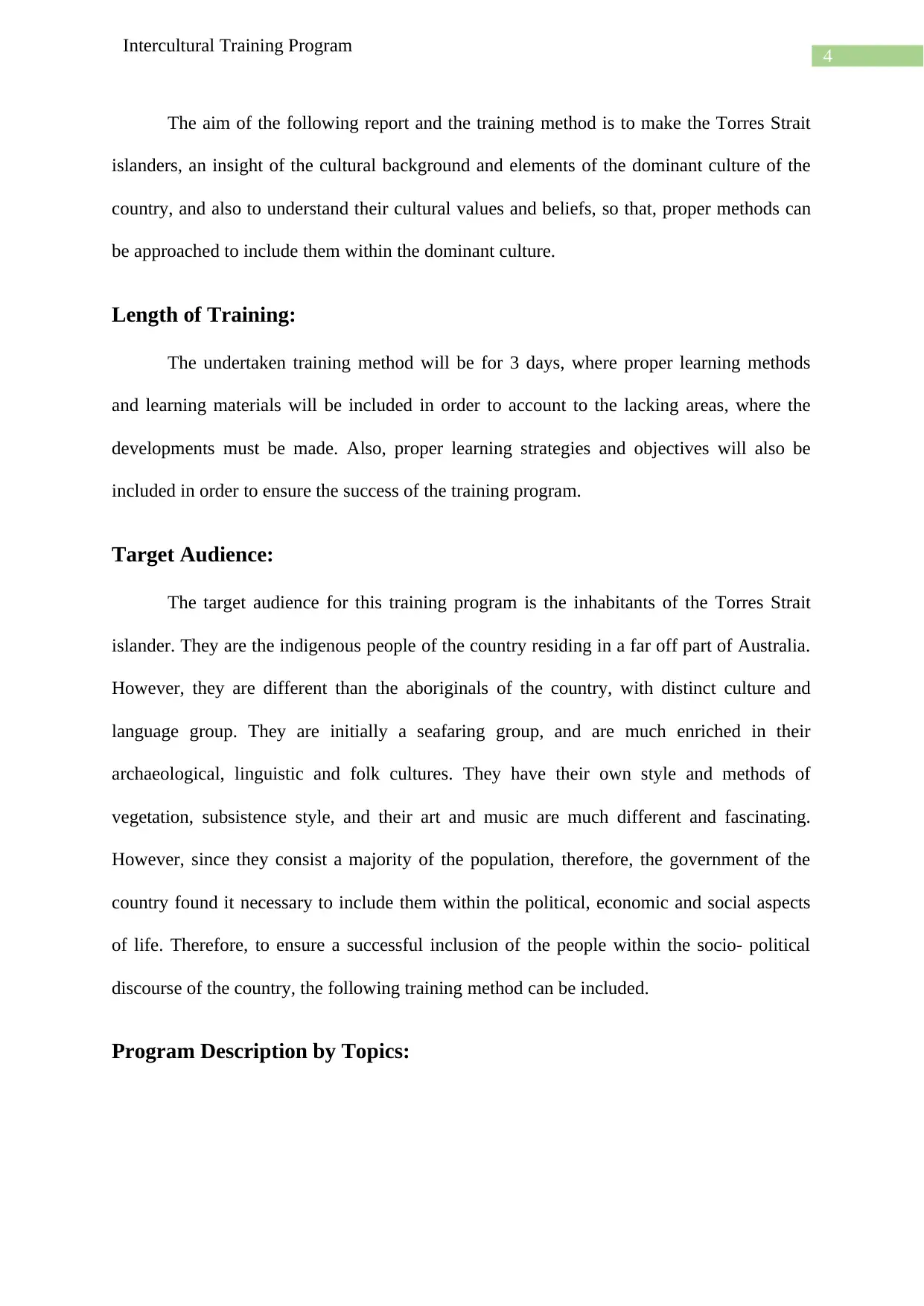
4
Intercultural Training Program
The aim of the following report and the training method is to make the Torres Strait
islanders, an insight of the cultural background and elements of the dominant culture of the
country, and also to understand their cultural values and beliefs, so that, proper methods can
be approached to include them within the dominant culture.
Length of Training:
The undertaken training method will be for 3 days, where proper learning methods
and learning materials will be included in order to account to the lacking areas, where the
developments must be made. Also, proper learning strategies and objectives will also be
included in order to ensure the success of the training program.
Target Audience:
The target audience for this training program is the inhabitants of the Torres Strait
islander. They are the indigenous people of the country residing in a far off part of Australia.
However, they are different than the aboriginals of the country, with distinct culture and
language group. They are initially a seafaring group, and are much enriched in their
archaeological, linguistic and folk cultures. They have their own style and methods of
vegetation, subsistence style, and their art and music are much different and fascinating.
However, since they consist a majority of the population, therefore, the government of the
country found it necessary to include them within the political, economic and social aspects
of life. Therefore, to ensure a successful inclusion of the people within the socio- political
discourse of the country, the following training method can be included.
Program Description by Topics:
Intercultural Training Program
The aim of the following report and the training method is to make the Torres Strait
islanders, an insight of the cultural background and elements of the dominant culture of the
country, and also to understand their cultural values and beliefs, so that, proper methods can
be approached to include them within the dominant culture.
Length of Training:
The undertaken training method will be for 3 days, where proper learning methods
and learning materials will be included in order to account to the lacking areas, where the
developments must be made. Also, proper learning strategies and objectives will also be
included in order to ensure the success of the training program.
Target Audience:
The target audience for this training program is the inhabitants of the Torres Strait
islander. They are the indigenous people of the country residing in a far off part of Australia.
However, they are different than the aboriginals of the country, with distinct culture and
language group. They are initially a seafaring group, and are much enriched in their
archaeological, linguistic and folk cultures. They have their own style and methods of
vegetation, subsistence style, and their art and music are much different and fascinating.
However, since they consist a majority of the population, therefore, the government of the
country found it necessary to include them within the political, economic and social aspects
of life. Therefore, to ensure a successful inclusion of the people within the socio- political
discourse of the country, the following training method can be included.
Program Description by Topics:
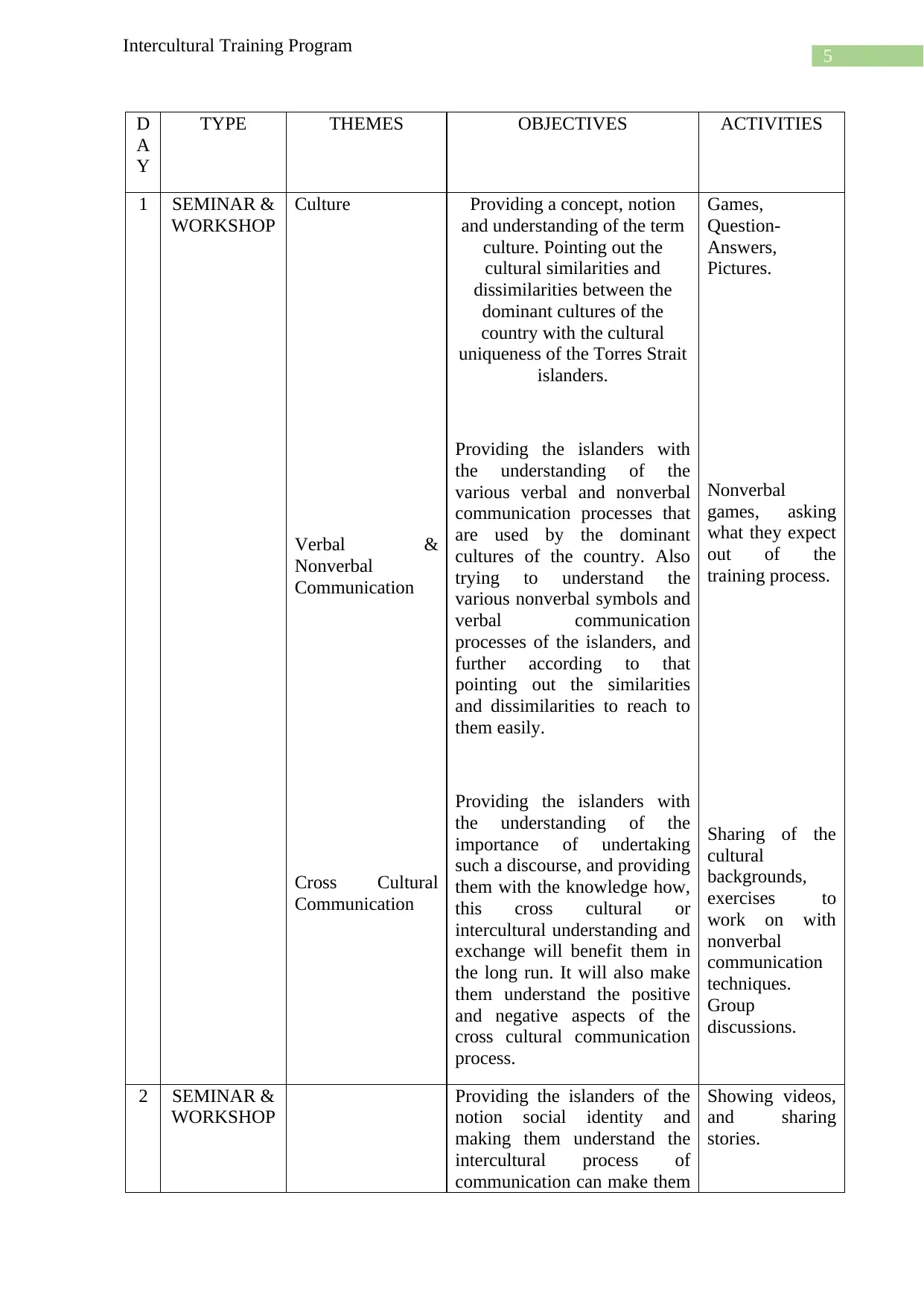
5
Intercultural Training Program
D
A
Y
TYPE THEMES OBJECTIVES ACTIVITIES
1 SEMINAR &
WORKSHOP
Culture
Verbal &
Nonverbal
Communication
Cross Cultural
Communication
Providing a concept, notion
and understanding of the term
culture. Pointing out the
cultural similarities and
dissimilarities between the
dominant cultures of the
country with the cultural
uniqueness of the Torres Strait
islanders.
Providing the islanders with
the understanding of the
various verbal and nonverbal
communication processes that
are used by the dominant
cultures of the country. Also
trying to understand the
various nonverbal symbols and
verbal communication
processes of the islanders, and
further according to that
pointing out the similarities
and dissimilarities to reach to
them easily.
Providing the islanders with
the understanding of the
importance of undertaking
such a discourse, and providing
them with the knowledge how,
this cross cultural or
intercultural understanding and
exchange will benefit them in
the long run. It will also make
them understand the positive
and negative aspects of the
cross cultural communication
process.
Games,
Question-
Answers,
Pictures.
Nonverbal
games, asking
what they expect
out of the
training process.
Sharing of the
cultural
backgrounds,
exercises to
work on with
nonverbal
communication
techniques.
Group
discussions.
2 SEMINAR &
WORKSHOP
Providing the islanders of the
notion social identity and
making them understand the
intercultural process of
communication can make them
Showing videos,
and sharing
stories.
Intercultural Training Program
D
A
Y
TYPE THEMES OBJECTIVES ACTIVITIES
1 SEMINAR &
WORKSHOP
Culture
Verbal &
Nonverbal
Communication
Cross Cultural
Communication
Providing a concept, notion
and understanding of the term
culture. Pointing out the
cultural similarities and
dissimilarities between the
dominant cultures of the
country with the cultural
uniqueness of the Torres Strait
islanders.
Providing the islanders with
the understanding of the
various verbal and nonverbal
communication processes that
are used by the dominant
cultures of the country. Also
trying to understand the
various nonverbal symbols and
verbal communication
processes of the islanders, and
further according to that
pointing out the similarities
and dissimilarities to reach to
them easily.
Providing the islanders with
the understanding of the
importance of undertaking
such a discourse, and providing
them with the knowledge how,
this cross cultural or
intercultural understanding and
exchange will benefit them in
the long run. It will also make
them understand the positive
and negative aspects of the
cross cultural communication
process.
Games,
Question-
Answers,
Pictures.
Nonverbal
games, asking
what they expect
out of the
training process.
Sharing of the
cultural
backgrounds,
exercises to
work on with
nonverbal
communication
techniques.
Group
discussions.
2 SEMINAR &
WORKSHOP
Providing the islanders of the
notion social identity and
making them understand the
intercultural process of
communication can make them
Showing videos,
and sharing
stories.
⊘ This is a preview!⊘
Do you want full access?
Subscribe today to unlock all pages.

Trusted by 1+ million students worldwide
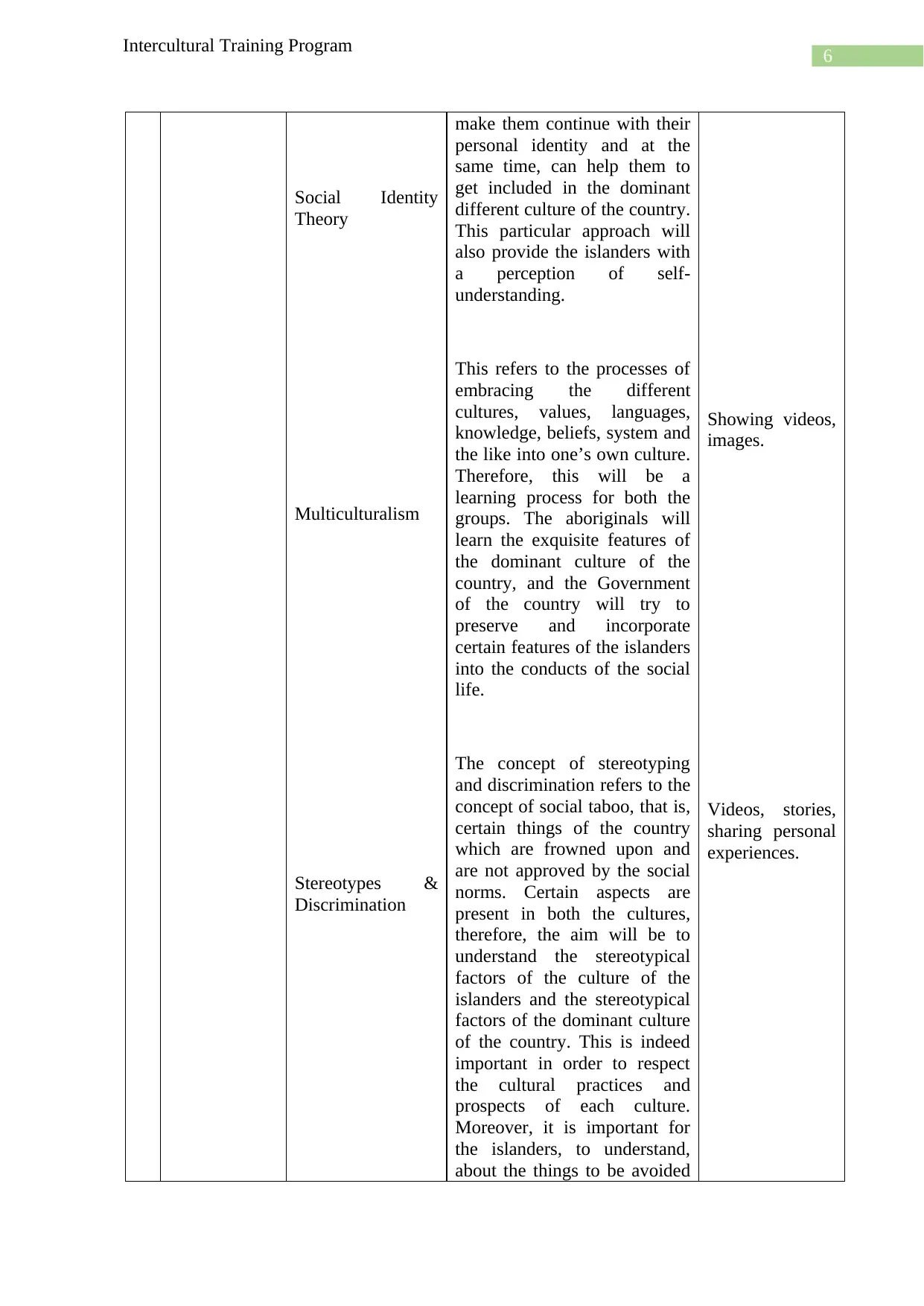
6
Intercultural Training Program
Social Identity
Theory
Multiculturalism
Stereotypes &
Discrimination
make them continue with their
personal identity and at the
same time, can help them to
get included in the dominant
different culture of the country.
This particular approach will
also provide the islanders with
a perception of self-
understanding.
This refers to the processes of
embracing the different
cultures, values, languages,
knowledge, beliefs, system and
the like into one’s own culture.
Therefore, this will be a
learning process for both the
groups. The aboriginals will
learn the exquisite features of
the dominant culture of the
country, and the Government
of the country will try to
preserve and incorporate
certain features of the islanders
into the conducts of the social
life.
The concept of stereotyping
and discrimination refers to the
concept of social taboo, that is,
certain things of the country
which are frowned upon and
are not approved by the social
norms. Certain aspects are
present in both the cultures,
therefore, the aim will be to
understand the stereotypical
factors of the culture of the
islanders and the stereotypical
factors of the dominant culture
of the country. This is indeed
important in order to respect
the cultural practices and
prospects of each culture.
Moreover, it is important for
the islanders, to understand,
about the things to be avoided
Showing videos,
images.
Videos, stories,
sharing personal
experiences.
Intercultural Training Program
Social Identity
Theory
Multiculturalism
Stereotypes &
Discrimination
make them continue with their
personal identity and at the
same time, can help them to
get included in the dominant
different culture of the country.
This particular approach will
also provide the islanders with
a perception of self-
understanding.
This refers to the processes of
embracing the different
cultures, values, languages,
knowledge, beliefs, system and
the like into one’s own culture.
Therefore, this will be a
learning process for both the
groups. The aboriginals will
learn the exquisite features of
the dominant culture of the
country, and the Government
of the country will try to
preserve and incorporate
certain features of the islanders
into the conducts of the social
life.
The concept of stereotyping
and discrimination refers to the
concept of social taboo, that is,
certain things of the country
which are frowned upon and
are not approved by the social
norms. Certain aspects are
present in both the cultures,
therefore, the aim will be to
understand the stereotypical
factors of the culture of the
islanders and the stereotypical
factors of the dominant culture
of the country. This is indeed
important in order to respect
the cultural practices and
prospects of each culture.
Moreover, it is important for
the islanders, to understand,
about the things to be avoided
Showing videos,
images.
Videos, stories,
sharing personal
experiences.
Paraphrase This Document
Need a fresh take? Get an instant paraphrase of this document with our AI Paraphraser
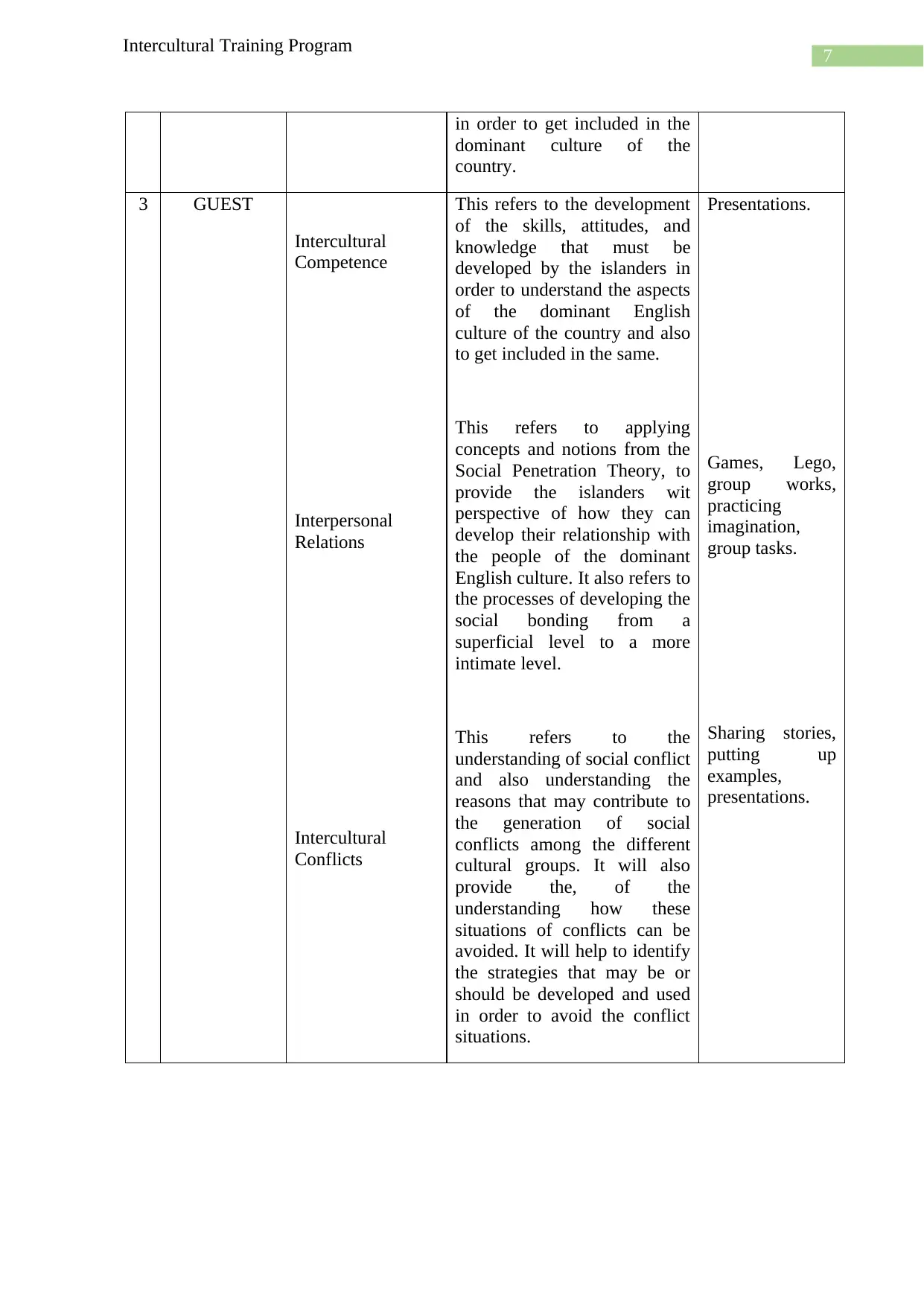
7
Intercultural Training Program
in order to get included in the
dominant culture of the
country.
3 GUEST
Intercultural
Competence
Interpersonal
Relations
Intercultural
Conflicts
This refers to the development
of the skills, attitudes, and
knowledge that must be
developed by the islanders in
order to understand the aspects
of the dominant English
culture of the country and also
to get included in the same.
This refers to applying
concepts and notions from the
Social Penetration Theory, to
provide the islanders wit
perspective of how they can
develop their relationship with
the people of the dominant
English culture. It also refers to
the processes of developing the
social bonding from a
superficial level to a more
intimate level.
This refers to the
understanding of social conflict
and also understanding the
reasons that may contribute to
the generation of social
conflicts among the different
cultural groups. It will also
provide the, of the
understanding how these
situations of conflicts can be
avoided. It will help to identify
the strategies that may be or
should be developed and used
in order to avoid the conflict
situations.
Presentations.
Games, Lego,
group works,
practicing
imagination,
group tasks.
Sharing stories,
putting up
examples,
presentations.
Intercultural Training Program
in order to get included in the
dominant culture of the
country.
3 GUEST
Intercultural
Competence
Interpersonal
Relations
Intercultural
Conflicts
This refers to the development
of the skills, attitudes, and
knowledge that must be
developed by the islanders in
order to understand the aspects
of the dominant English
culture of the country and also
to get included in the same.
This refers to applying
concepts and notions from the
Social Penetration Theory, to
provide the islanders wit
perspective of how they can
develop their relationship with
the people of the dominant
English culture. It also refers to
the processes of developing the
social bonding from a
superficial level to a more
intimate level.
This refers to the
understanding of social conflict
and also understanding the
reasons that may contribute to
the generation of social
conflicts among the different
cultural groups. It will also
provide the, of the
understanding how these
situations of conflicts can be
avoided. It will help to identify
the strategies that may be or
should be developed and used
in order to avoid the conflict
situations.
Presentations.
Games, Lego,
group works,
practicing
imagination,
group tasks.
Sharing stories,
putting up
examples,
presentations.
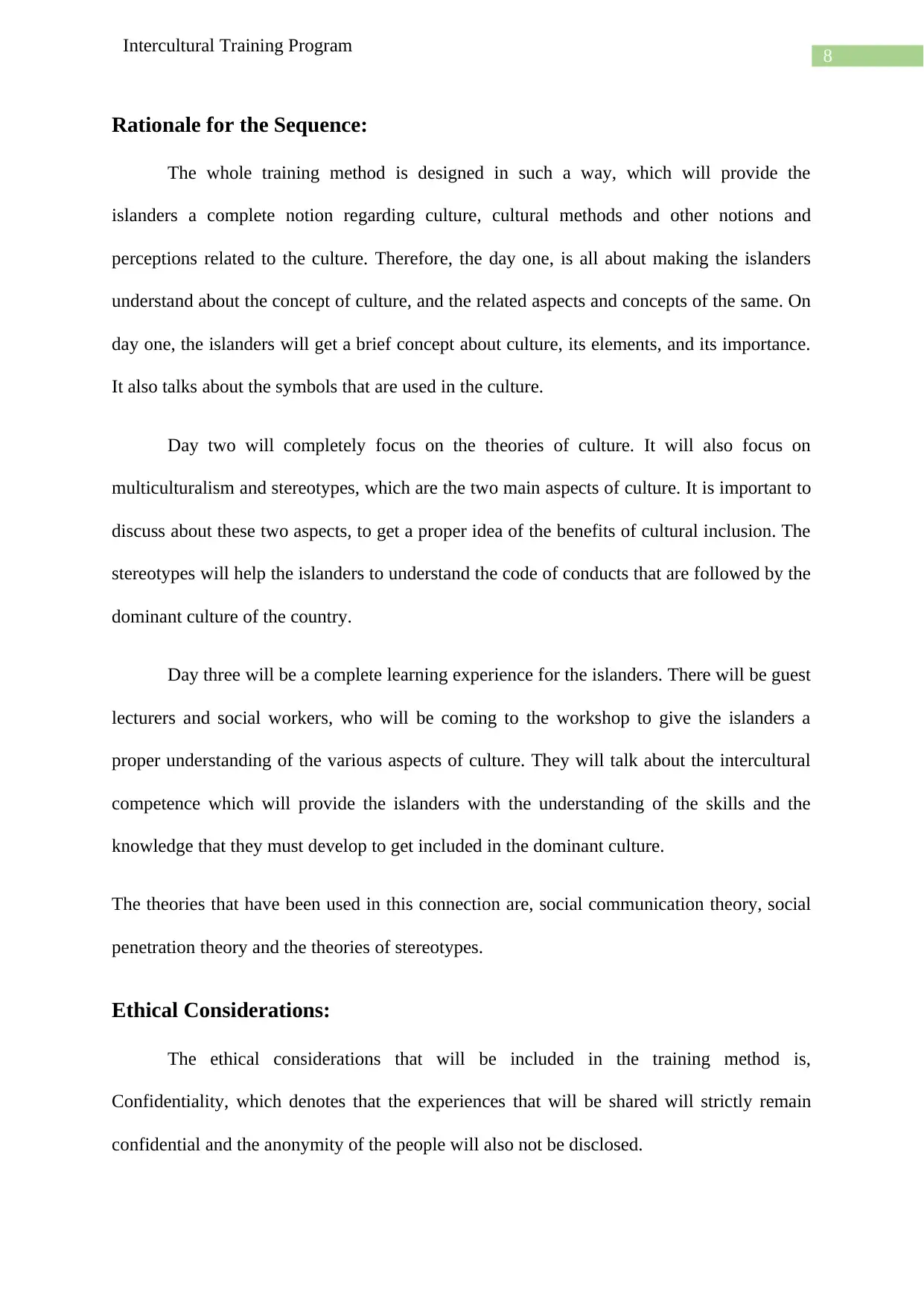
8
Intercultural Training Program
Rationale for the Sequence:
The whole training method is designed in such a way, which will provide the
islanders a complete notion regarding culture, cultural methods and other notions and
perceptions related to the culture. Therefore, the day one, is all about making the islanders
understand about the concept of culture, and the related aspects and concepts of the same. On
day one, the islanders will get a brief concept about culture, its elements, and its importance.
It also talks about the symbols that are used in the culture.
Day two will completely focus on the theories of culture. It will also focus on
multiculturalism and stereotypes, which are the two main aspects of culture. It is important to
discuss about these two aspects, to get a proper idea of the benefits of cultural inclusion. The
stereotypes will help the islanders to understand the code of conducts that are followed by the
dominant culture of the country.
Day three will be a complete learning experience for the islanders. There will be guest
lecturers and social workers, who will be coming to the workshop to give the islanders a
proper understanding of the various aspects of culture. They will talk about the intercultural
competence which will provide the islanders with the understanding of the skills and the
knowledge that they must develop to get included in the dominant culture.
The theories that have been used in this connection are, social communication theory, social
penetration theory and the theories of stereotypes.
Ethical Considerations:
The ethical considerations that will be included in the training method is,
Confidentiality, which denotes that the experiences that will be shared will strictly remain
confidential and the anonymity of the people will also not be disclosed.
Intercultural Training Program
Rationale for the Sequence:
The whole training method is designed in such a way, which will provide the
islanders a complete notion regarding culture, cultural methods and other notions and
perceptions related to the culture. Therefore, the day one, is all about making the islanders
understand about the concept of culture, and the related aspects and concepts of the same. On
day one, the islanders will get a brief concept about culture, its elements, and its importance.
It also talks about the symbols that are used in the culture.
Day two will completely focus on the theories of culture. It will also focus on
multiculturalism and stereotypes, which are the two main aspects of culture. It is important to
discuss about these two aspects, to get a proper idea of the benefits of cultural inclusion. The
stereotypes will help the islanders to understand the code of conducts that are followed by the
dominant culture of the country.
Day three will be a complete learning experience for the islanders. There will be guest
lecturers and social workers, who will be coming to the workshop to give the islanders a
proper understanding of the various aspects of culture. They will talk about the intercultural
competence which will provide the islanders with the understanding of the skills and the
knowledge that they must develop to get included in the dominant culture.
The theories that have been used in this connection are, social communication theory, social
penetration theory and the theories of stereotypes.
Ethical Considerations:
The ethical considerations that will be included in the training method is,
Confidentiality, which denotes that the experiences that will be shared will strictly remain
confidential and the anonymity of the people will also not be disclosed.
⊘ This is a preview!⊘
Do you want full access?
Subscribe today to unlock all pages.

Trusted by 1+ million students worldwide
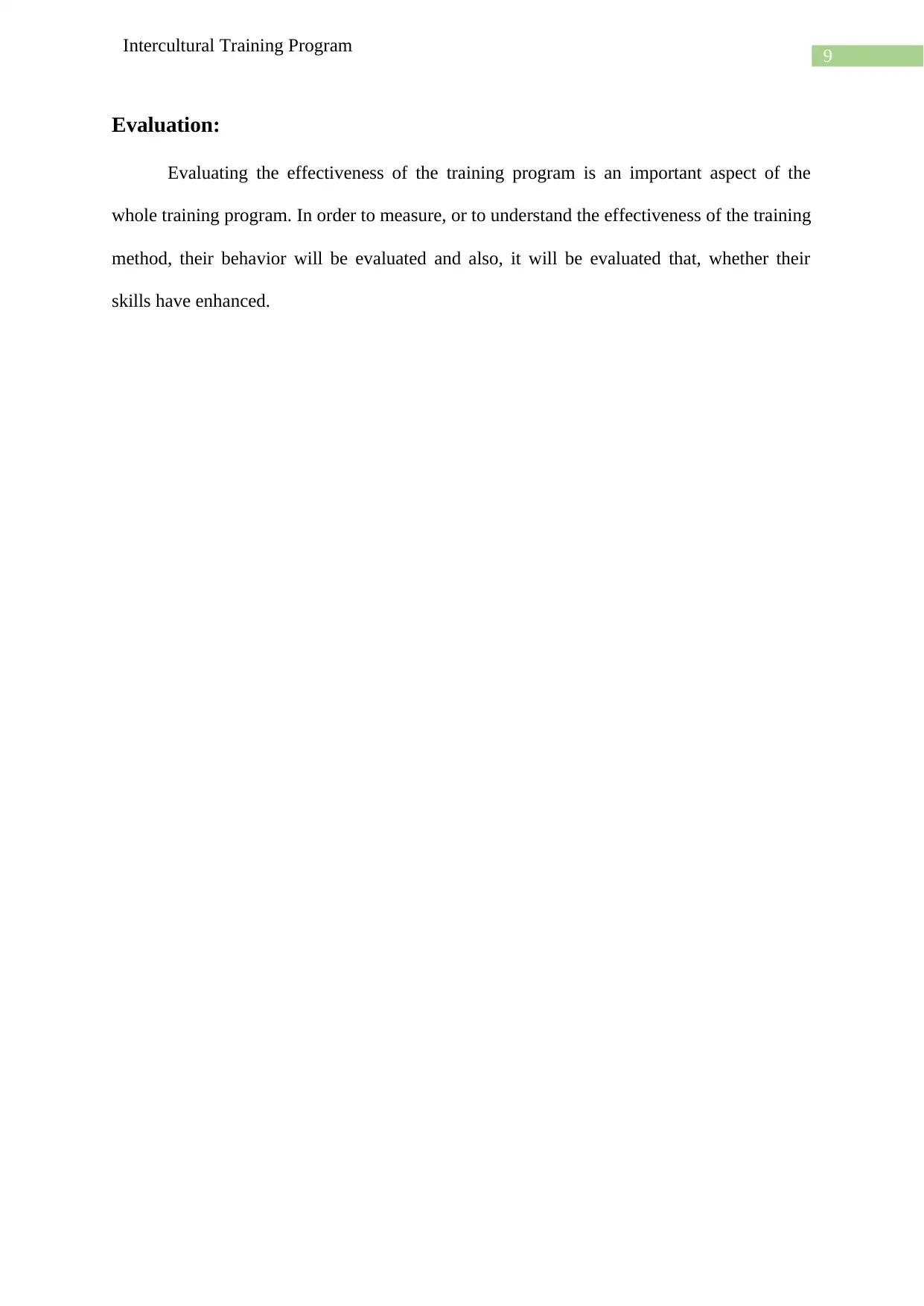
9
Intercultural Training Program
Evaluation:
Evaluating the effectiveness of the training program is an important aspect of the
whole training program. In order to measure, or to understand the effectiveness of the training
method, their behavior will be evaluated and also, it will be evaluated that, whether their
skills have enhanced.
Intercultural Training Program
Evaluation:
Evaluating the effectiveness of the training program is an important aspect of the
whole training program. In order to measure, or to understand the effectiveness of the training
method, their behavior will be evaluated and also, it will be evaluated that, whether their
skills have enhanced.
Paraphrase This Document
Need a fresh take? Get an instant paraphrase of this document with our AI Paraphraser
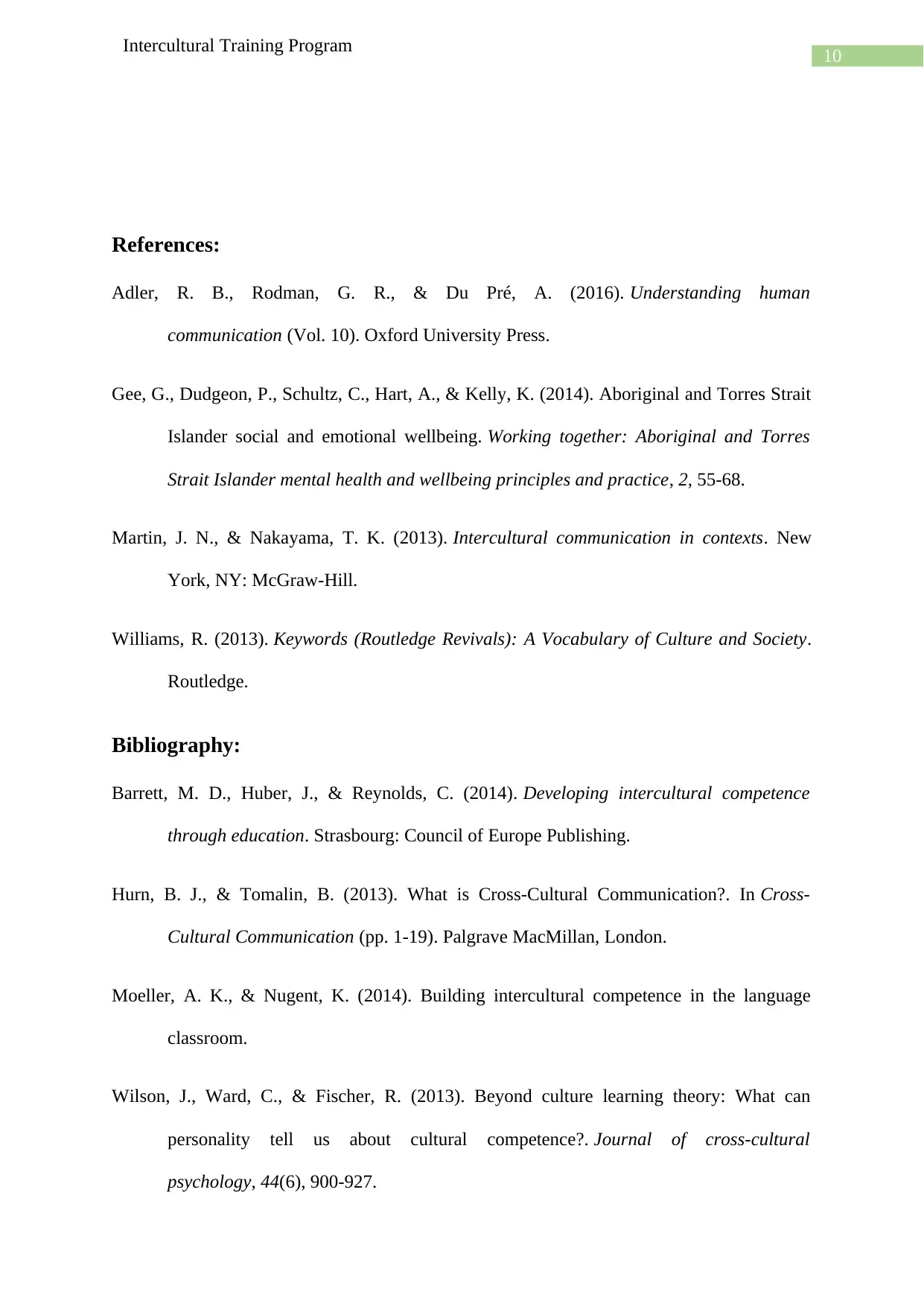
10
Intercultural Training Program
References:
Adler, R. B., Rodman, G. R., & Du Pré, A. (2016). Understanding human
communication (Vol. 10). Oxford University Press.
Gee, G., Dudgeon, P., Schultz, C., Hart, A., & Kelly, K. (2014). Aboriginal and Torres Strait
Islander social and emotional wellbeing. Working together: Aboriginal and Torres
Strait Islander mental health and wellbeing principles and practice, 2, 55-68.
Martin, J. N., & Nakayama, T. K. (2013). Intercultural communication in contexts. New
York, NY: McGraw-Hill.
Williams, R. (2013). Keywords (Routledge Revivals): A Vocabulary of Culture and Society.
Routledge.
Bibliography:
Barrett, M. D., Huber, J., & Reynolds, C. (2014). Developing intercultural competence
through education. Strasbourg: Council of Europe Publishing.
Hurn, B. J., & Tomalin, B. (2013). What is Cross-Cultural Communication?. In Cross-
Cultural Communication (pp. 1-19). Palgrave MacMillan, London.
Moeller, A. K., & Nugent, K. (2014). Building intercultural competence in the language
classroom.
Wilson, J., Ward, C., & Fischer, R. (2013). Beyond culture learning theory: What can
personality tell us about cultural competence?. Journal of cross-cultural
psychology, 44(6), 900-927.
Intercultural Training Program
References:
Adler, R. B., Rodman, G. R., & Du Pré, A. (2016). Understanding human
communication (Vol. 10). Oxford University Press.
Gee, G., Dudgeon, P., Schultz, C., Hart, A., & Kelly, K. (2014). Aboriginal and Torres Strait
Islander social and emotional wellbeing. Working together: Aboriginal and Torres
Strait Islander mental health and wellbeing principles and practice, 2, 55-68.
Martin, J. N., & Nakayama, T. K. (2013). Intercultural communication in contexts. New
York, NY: McGraw-Hill.
Williams, R. (2013). Keywords (Routledge Revivals): A Vocabulary of Culture and Society.
Routledge.
Bibliography:
Barrett, M. D., Huber, J., & Reynolds, C. (2014). Developing intercultural competence
through education. Strasbourg: Council of Europe Publishing.
Hurn, B. J., & Tomalin, B. (2013). What is Cross-Cultural Communication?. In Cross-
Cultural Communication (pp. 1-19). Palgrave MacMillan, London.
Moeller, A. K., & Nugent, K. (2014). Building intercultural competence in the language
classroom.
Wilson, J., Ward, C., & Fischer, R. (2013). Beyond culture learning theory: What can
personality tell us about cultural competence?. Journal of cross-cultural
psychology, 44(6), 900-927.
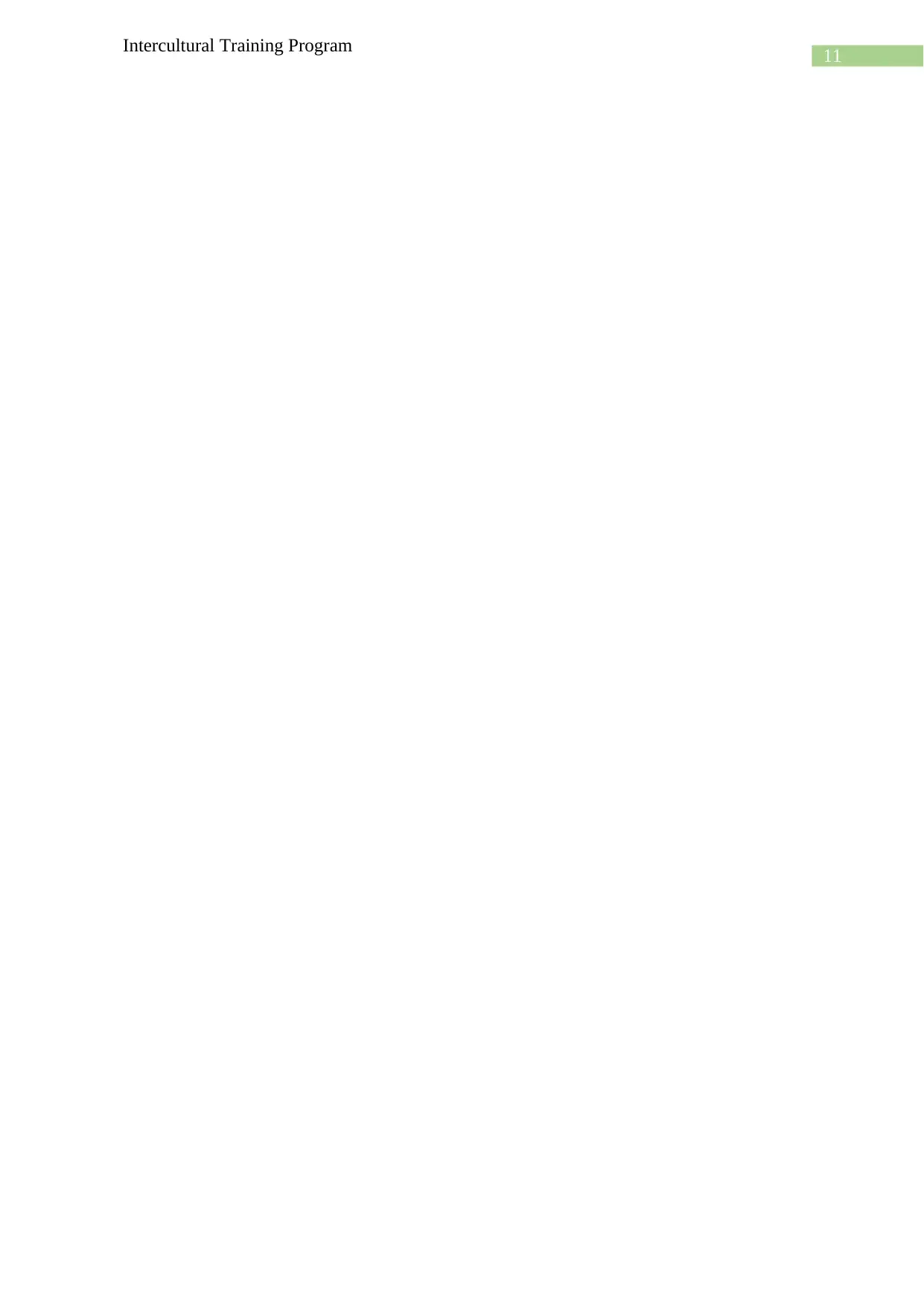
11
Intercultural Training Program
Intercultural Training Program
⊘ This is a preview!⊘
Do you want full access?
Subscribe today to unlock all pages.

Trusted by 1+ million students worldwide
1 out of 12
Related Documents
Your All-in-One AI-Powered Toolkit for Academic Success.
+13062052269
info@desklib.com
Available 24*7 on WhatsApp / Email
![[object Object]](/_next/static/media/star-bottom.7253800d.svg)
Unlock your academic potential
Copyright © 2020–2026 A2Z Services. All Rights Reserved. Developed and managed by ZUCOL.





